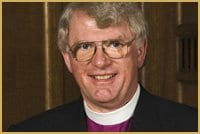It was defeated by the slimmest of votes, but a motion to allow individual Anglican dioceses to bless same-sex unions was defeated nonetheless at the church’s general synod in Winnipeg, Jun 24.
The motion would have allowed local dioceses within the Anglican Church of Canada to bless same-sex unions in parish churches, with the approval of the local bishop, “in a manner which respects the conscience of the incumbent [parish priest] and the will of the parish.”
After eight hours of often tense debate, the Canadian bishops voted 21-19 against the motion, thus vetoing the majority votes in favour by both the assembled lay people and the priests.
The motion would have needed majorities in all three voting bodies to pass. The lay people voted 78-59 in favour of allowing local same-sex blessings; the priests were not far behind with a 63-53 vote in favour.
It wasn’t enough.
“It’s a bitter pill for those in our church who are frustrated and wanted to move forward,” New Westminster Bishop Michael Ingham told the Vancouver Sun after the vote. Ingham’s diocese is the only one in Canada to officially bless same-sex unions. It’s been doing so since 2003.
“The decision raises serious doubts about leadership — when the whole church is held back by two bishops,” Ingham continued.
“We look to our bishops for leadership. Unfortunately we have not had leadership among the bishops here.”
David Ball and Gwen McAllister, both involved with the Student Christian Movement of Canada, question the role the bishops played in voting down the blessings.
“There’s something beautiful about the traditions and stuff — the robes, and the ceremony — so I wouldn’t want to get rid of it [the synod],” says Ball. “But [the bishops] should listen to the people.”
“It makes me wonder who gets made a bishop, and why,” says McAllister. “How it is that the people who become bishops aren’t necessarily representative of the laity?”
The new head of the Anglican Church of Canada, Primate-elect Fred Hiltz, voted in favour of same-sex blessings at the synod.
Hiltz says the synod’s decision only means that the Anglican Church needs more time.
“We’ve been talking about it for 30 years,” he says.
Canadian Anglicans meet once every three years to debate policy and elect a new leader. The blessing of gay unions is an issue that was carried over from the 2004 national meeting.
Hiltz, installed Jun 25, will now lead the Anglican Church of Canada for the next three years, when it will meet for its 39th general synod — and likely be pressed to make another decision on the blessing of same-sex unions.
“I think people are looking to the Church to make a statement, a decision one way or the other,” Hiltz says. “The outcome of the decision, for many people was very painful — for gays and lesbians — because it means we’re into another three years of further study and discernment.
“And for others, who welcome that time for discernment and study, it was a very good decision,” he adds.
Hiltz says he believes “in the synodical process — and I am certainly prepared, if the synod were to move in that direction, I would be supportive of it.”
Some delegates welcomed the reprieve for more study.
The synod worked hard to discern God’s will, and will keep working, says Rev Canon Murray Still, an aboriginal mission developer in the diocese of Rupert’s Land, in Northern Manitoba.
“We chose not to bless same-sex unions at this time. The bishops gave us their wisdom that we need more time for discussion, more time for getting more knowledge and more discussion in our communities, in particular the aboriginal communities,” says Still.
Other delegates simply welcomed the reprieve.
“Homosexual behaviour is not in line with Scripture of my prayer book. We can call it sin. My desire is for people to be whole and come back into line with God’s will,” Bishop Larry Robertson of the Arctic declared at the debate.
Earlier in the day, a majority of delegates approved a motion to confirm that blessing same-sex unions does not contravene the core doctrine of the Anglican Church. But theory did not translate into practice.
“To say that the blessing of same-sex unions is not in conflict with doctrine is a hugely significant thing,” Ingham told the Globe and Mail, Jun 26. “But to say at the same time there’s no doctrinal conflict but we’re not going to [do] anything about it is inertia — it’s institutional inertia rooted in homophobia.”
Several bishops who opposed the motion to approve local blessings told the synod that a yes vote would have violated the oath Anglican priests take to remain in communion with their Anglican peers throughout the world. Many Anglicans in Africa and Asia have threatened to sever ties with the Anglican Church of Canada if it continues supporting homosexuals.
Ingham says he needs to time to reflect on the synod’s decision and how it might impact his New Westminster diocese.
But he doesn’t intend to give up the battle to bless same-sex unions, he says.
“We remain strongly committed to supporting gay and lesbian members of our church and in the wider society,” he told the Vancouver Sun, Jun 26. “Our support… is undiminished.”
— with files from Tessa Vanderhart

 Why you can trust Xtra
Why you can trust Xtra


